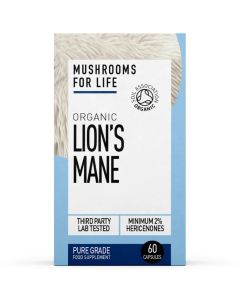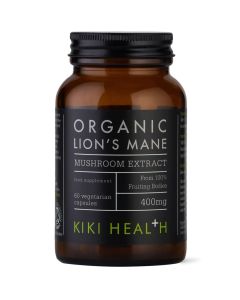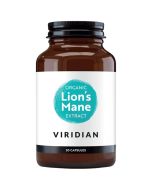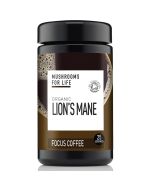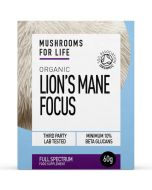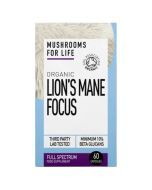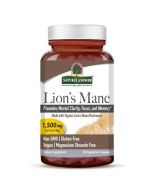
The benefits of Lion's Mane for our brain
Lion’s Mane mushrooms have gained in popularity, and this is likely due to its numerous medicinal benefits which can range from supporting brain health and reducing inflammation to supporting gut health.
What are Lion’s Mane Mushrooms?
Lion’s Mane, scientifically known as Hericium erinaceaus, is a type of edible fungi. This unique mushroom is identifiable with its distinctive, shaggy appearance of cascading white strands, which looks like the mane of a lion.
These mushrooms typically grow and thrive on rotting hardwood trees. Examples of these include oak, maple and birch. They are native to several regions including Asia, Europe and North America.
Lion’s Mane has traditionally been used for its medicinal properties, particularly in East Asian cultures, where it has been used for centuries to enhance cognitive function and boost overall wellbeing.
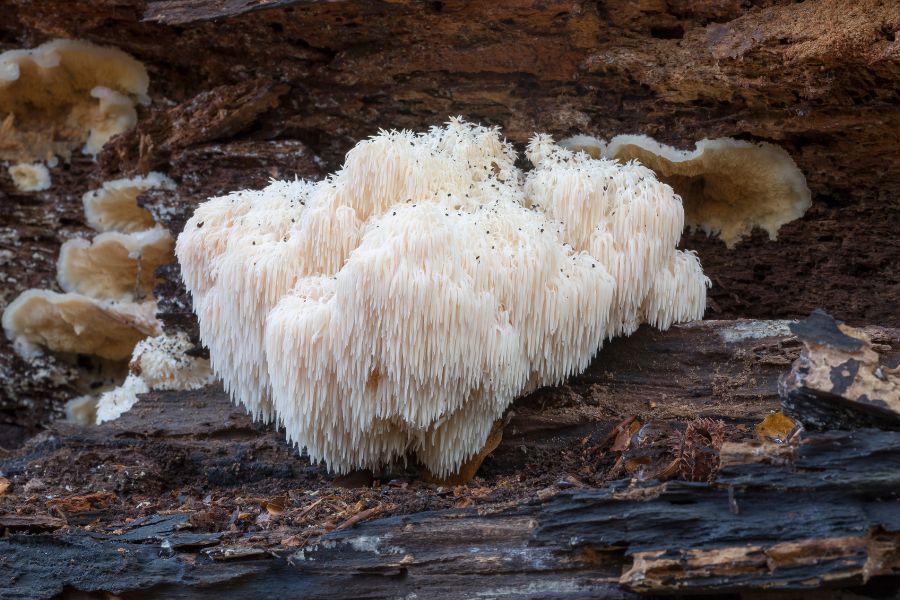
What are the key compounds In Lion’s Mane mushrooms?
Hericenones:
Hericenones are compounds that can be found within the fruiting body of the mushroom. One of the most notable benefits is their ability to stimulate the production of nerve growth factor (NGF) which is a protein that is essential for the growth and maintenance of neurons. Neurons are used to signal and transmit information throughout the body. By promoting NGF synthesis, hericenones also help in the repair and regeneration of nerve cells, which can help to potentially maintain cognitive function and protect against neurodegenerative disease.
Erinacines:
Erinacines are found in the mycelium or vegetative part of the mushroom. Also classified as diterpenoids, these compounds are known for their potential neuroprotective and anti-inflammatory properties, helping to reduce inflammation in the brain. These compounds can also stimulate the synthesis of NGF which can help to promote nerve repair and enhance cognitive function.
Polysaccharides:
Lion’s Mane mushrooms contain polysaccharides including Beta-glucans which help to modulate the immune system by activating immune cells. They also provide anti-inflammatory and antioxidant effects which may help to provide neuroprotective properties.
Antioxidants:
Lion’s Mane mushrooms contain antioxidants like phenolic compounds, flavonoids, and polysaccharides which help to neutralise free radicals and prevent oxidative stress. These compounds help to protect neurons from oxidative damage and inflammation as well as promote the synthesis of nerve growth factor which is important for the maintenance of neurons.
Benefits of Lion’s Mane Mushrooms for the brain:
Supports brain function:
Lion’s Mane contains key compounds which help to stimulate the production of nerve growth factor (NGF). NGF is important for the growth, maintenance, and survival of neurons, which are the main cell type in the brain responsible for transmitting information. This helps to promote neuronal health and function, potentially preventing neurodegeneration and reducing brain fog. Lion’s Mane may also help with overall cognitive performance including focus, attention and concentration.
Neuroprotective properties:
Preclinical studies suggest that lion’s mane may reduce inflammation and decrease the formation of amyloid plaques, which are biological markers associated with Alzheimer’s disease. Lion’s Mane may therefore be beneficial in reducing the risk of cognitive decline and protect against other neurodegenerative diseases.
Support anxiety and depression:
Lion’s Mane Mushrooms may also offer benefits for mood, with studies showing that Lion’s Mane may help to alleviate symptoms of anxiety and depression. Research indicates that this mushroom may help to balance levels of the neurotransmitters serotonin and dopamine which help with mood regulation and contribute to emotional well-being.
Antioxidant and Anti-inflammatory properties:
Antioxidants in lion's mane combat oxidative stress by neutralising free radicals in the body. Its anti-inflammatory compounds help reduce inflammation, which is linked to chronic diseases including cardiovascular disease and arthritis as well as neurodegeneration and ageing of the brain. By mitigating oxidative stress and inflammation, lion's mane supports overall health including the brain.
How to take Lion’s Mane Mushrooms:
Lion’s Mane can come in different forms, from capsules to powders allowing it to be conveniently added into your healthcare routine. For powdered Lion's Mane, a typical daily dosage can range from 500 to 3000 mg. On the other hand, if you prefer capsules, it is generally recommended to take a daily dose between 500-1000mg.
While there isn't a universally optimal time to take Lion's Mane, many find it beneficial to consume in the morning to take advantage of its potential cognitive and energy-boosting effects, such as enhanced focus and mental clarity. Taking it with or after meals can help minimise the risk of gastrointestinal discomfort.
Lion's Mane is considered safe for daily use, allowing individuals to consistently support their brain health and overall well-being.
Summary:
- Lion's Mane mushrooms, known scientifically as Hericium erinaceus, are distinctive for their shaggy appearance and has traditionally been used to enhance cognitive function and overall well-being.
- Lion's Mane contains key bioactive compounds including hericenones, erinacines and beta-glucans which help to stimulate nerve growth factor (NGF) aiding in neuron growth and maintenance as well as protect the body from oxidative stress and inflammation.
- Lion's Mane supports brain function by promoting neuronal health and cognitive performance. It also has neuroprotective properties and may help alleviate symptoms of anxiety and depression by balancing serotonin and dopamine levels.
- Lion's Mane is available in capsules and powders, with a daily dosage ranging from 500 to 3000 mg. It's safe for daily use, often consumed in the morning for cognitive and energy-boosting effects.
Best Lion’s Mane Supplements:
The Mushrooms for Life Organic Lion’s Mane Capsules are a 100% fruiting body extract of Lion’s Mane that is duel extracted. This allows it to release and concentrate its polysaccharides and key compounds to allow for maximum benefits for the body.
It is also available in powder form.
The KIKI Health Organic Lion’s Mane Mushroom Extract Vegicaps contain 100% pure lion’s mane extract which is standardised to 50% beta-glucan polysaccharide content. This product is suitable for vegetarians and vegans and is free from artificial additives, gluten, and wheat.
It is also available in powder form.
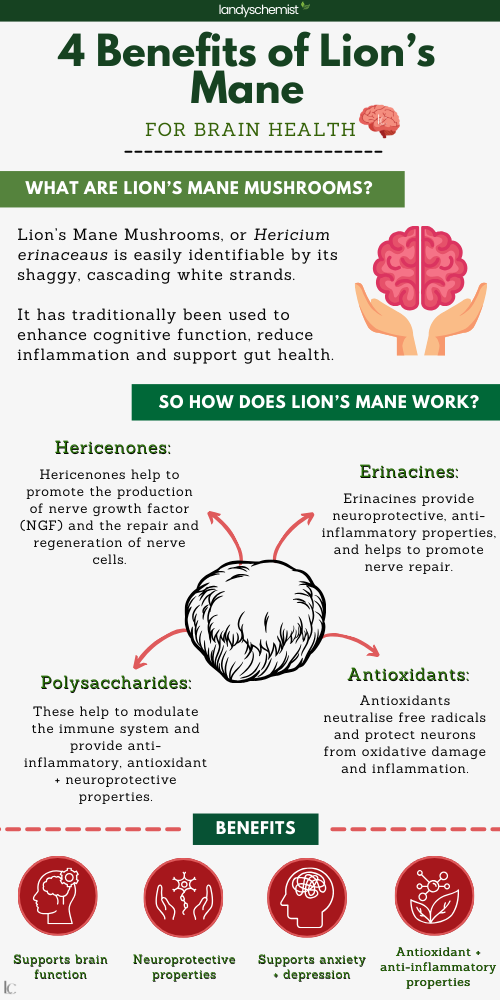
Commonly asked questions:
How long does it take for Lion’s Mane to work?
The length of time it takes for noticeable benefits of Lion’s Mane can vary dependent on the individual taking the mushroom. Some may experience benefits within the first few days, or it can take a few weeks, however it is best to stay consistent for at least 2 months.
Are there any side effects or risks of taking Lion’s Mane Mushrooms?
While Lion's Mane mushrooms are generally considered safe and well-tolerated, some individuals may experience adverse effects like nausea and stomach upset.
People with mushroom allergies should avoid Lion's Mane, as it can trigger allergic reactions. Additionally, those on diabetes medications should exercise caution, as Lion's Mane can potentially lower blood sugar levels.
It is also advisable for individuals taking blood thinners to avoid using Lion's Mane due to its anticoagulant effects, which may increase the risk of bleeding.
There is limited evidence on the effects of lion’s mane on pregnant or breastfeeding women and so it is advised to speak to your healthcare professional prior to taking these. Furthermore, it is recommended to stop using Lion's Mane prior to any scheduled surgery because of its effects on blood clotting.
Disclaimer:
This article is for informational purposes only and is not a substitute for medical advice. Consult your doctor or healthcare provider before starting any supplements, treatments, or remedies. Ensure a varied and balanced diet and a healthy lifestyle before considering supplements. Supplements should not replace a balanced diet.
References:
- Corlier F, Hafzalla G, Faskowitz J, et al. (2018) “Systemic inflammation as a predictor of brain aging: Contributions of physical activity, metabolic risk, and genetic risk.” Neuroimage. 2018; 172:118-129. doi:10.1016/j.neuroimage.2017.12.027.
- Docherty, Sarah et al. (2023) “The Acute and Chronic Effects of Lion's Mane Mushroom Supplementation on Cognitive Function, Stress and Mood in Young Adults: A Double-Blind, Parallel Groups, Pilot Study.” Nutrients vol. 15,22 4842., doi:10.3390/nu15224842.
- Ghosh, Sandipta et al. (2021) “Prospecting medicinal properties of Lion's mane mushroom.” Journal of food biochemistry, e13833., doi:10.1111/jfbc.13833.
- Gravina, Antonietta Gerarda et al. (2023) “Hericium erinaceus, a medicinal fungus with a centuries-old history: Evidence in gastrointestinal diseases.” World journal of gastroenterology vol. 29,20 (2023): 3048-3065. doi:10.3748/wjg.v29.i20.3048.
- Kawagishi, H. et al. (1991) ‘Hericenones C, D and E, stimulators of nerve growth factor (ngf)-synthesis, from the mushroom Hericium Erinaceum’, Tetrahedron Letters, 32(35), pp. 4561–4564. doi:10.1016/0040-4039(91)80039-9.
- Khan, Md.A. et al. (2013) ‘Hericium erinaceus: An edible mushroom with medicinal values’, Journal of Complementary and Integrative Medicine, 10(1). doi:10.1515/jcim-2013-0001.
- Kim, Seonghun. (2020) “Antioxidant Compounds for the Inhibition of Enzymatic Browning by Polyphenol Oxidases in the Fruiting Body Extract of the Edible Mushroom Hericium erinaceus.” Foods (Basel, Switzerland) vol. 9,7 951., doi:10.3390/foods9070951.
- Lai, P.-L. et al. (2013) ‘Neurotrophic properties of the Lion’s mane medicinal mushroom, hericium erinaceus (higher basidiomycetes) from Malaysia’, International Journal of Medicinal Mushrooms, 15(6), pp. 539–554. doi:10.1615/intjmedmushr.v15.i6.30.
- Li, I.-C. et al. (2018) ‘Neurohealth properties of hericium erinaceus mycelia enriched with erinacines’, Behavioural Neurology, 2018, pp. 1–10. doi:10.1155/2018/5802634.
- Li, I-Chen et al. (2020) “Prevention of Early Alzheimer's Disease by Erinacine A-Enriched Hericium erinaceus Mycelia Pilot Double-Blind Placebo-Controlled Study.” Frontiers in aging neuroscience vol. 12 155., doi:10.3389/fnagi.2020.00155.
- Lee, Kam-Fai et al. (2014) “Protective effects of Hericium erinaceus mycelium and its isolated erinacine A against ischemia-injury-induced neuronal cell death via the inhibition of iNOS/p38 MAPK and nitrotyrosine.” International journal of molecular sciences vol. 15,9 15073-89, doi:10.3390/ijms150915073
- Ludwig PE, Reddy V, Varacallo M. (2023) “Neuroanatomy, Neurons.” In: StatPearls. Treasure Island (FL): StatPearls Publishing. PMID: 28723006.
- Łysakowska, Paulina et al. (2023) “Medicinal Mushrooms: Their Bioactive Components, Nutritional Value and Application in Functional Food Production-A Review.” Molecules (Basel, Switzerland) vol. 28,14 5393. , doi:10.3390/molecules28145393.
- Nagano, M. et al. (2010) ‘Reduction of depression and anxiety by 4 weeks Hericium Erinaceus Intake’, Biomedical Research, 31(4), pp. 231–237. doi:10.2220/biomedres.31.231.
- Rodriguez, M.N. and Lippi, S.L. (2022) ‘Lion’s Mane (hericium erinaceus) exerts anxiolytic effects in the RTG4510 tau mouse model’, Behavioral Sciences, 12(7), p. 235. doi:10.3390/bs12070235.
- SAITSU, Y. et al. (2019) ‘Improvement of cognitive functions by oral intake of hericium erinaceus’, Biomedical Research, 40(4), pp. 125–131. doi:10.2220/biomedres.40.125.
- Szućko-Kociuba I, Trzeciak-Ryczek A, Kupnicka P, Chlubek D. (2023) ‘Neurotrophic and Neuroprotective Effects of Hericium erinaceus’. Int J Mol Sci. 2023 Nov 3;24(21):15960. doi: 10.3390/ijms242115960.

